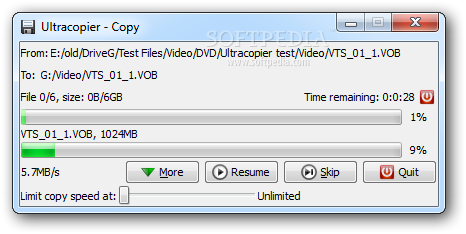
at ( config_idx )) + " Hz (PRN #" + std :: to_string ( FLAGS_test_satellite_PRN ) + ")" ) Īctcd19/main/g/gnss-sdr/gnss-sdr_0.0.9-5/src/tests/system-tests/obs_gps_l1_system_:229Ĭonfig -> set_property ( "SignalSource.sampling_frequency", std :: to_string ( sampling_rate_internal )) Ĭonfig -> set_property ( "em_type", "ibyte" ) Ĭonfig -> set_property ( "SignalSource.samples", std :: to_string ( zero )) Īctcd19/main/t/trilinos/trilinos_12.12.1-7/packages/stk/stk_simd/unit_tests/SimdFixture.hpp:268 at ( config_idx )) + "," + std :: to_string ( DLL_wide_bw_values. set_title ( "Code delay error, PLL/DLL BW: " + std :: to_string ( PLL_wide_bw_values.
#Ultracopier free key code#
Three of the seven FP calls are in test code with one of them used to formatĪctcd19/main/g/gnss-sdr/gnss-sdr_0.0.10-4/src/tests/unit-tests/signal-processing-blocks/tracking/gps_l1_ca_dll_pll_tracking_:916 The two remaining cases are a generic wrapper around std :: to_string and an overload for a user-defined type. Note that some of these 7 results contain calls with integral and FP arguments Integral arguments and only 7 contain calls with floating-point arguments. We further analyzed a random sample of 100 std :: to_string invocations listed in Appendix A. For comparison, thereĪre ~20 thousand uses of std :: stringstream and ~390 thousand calls to sprintf. 876 million lines of codeĬontained only ~11 thousand calls to this function. In order to estimate the practical impact on existing code we looked at results for std :: to_string. In cases where the C locale is explicitly set the decimal point will no longer In most cases it will result in a more precise and/or shorter output. This change will affect the output of std :: to_string with floating-pointĪrguments. In addition to fixing the broken behavior for floating point, this proposalĮnables an easy and natural extension of std :: to_string to other types via std :: format (not proposed in this paper). Unlocalized and use the shortest decimal representation. Unlocalized and changing the format of floating-point overloads to also be Redefine std :: to_string in terms of std :: format which in turn uses std :: to_chars making more explicit the fact that integral overloads are ( ) which proposed deprecating floating-point overloads of std :: to_string but no paper came out of that.

However, they were brought up as early as 2015 in a mailing list discussion Unfortunately issues with floating-point overloads of std :: to_string have notīeen discussed in the paper that proposed this facility (, ). In fact almost half of floating-point numbers are formatted as zero and there isĪ precision loss or garbage digit output in many other cases. For example: std :: cout << std :: to_string ( -1e-7 ) And finally we have 6 meaningless zeros after aįormatting of small floating-point numbers is even less useful. Here only the first 17 digits are meaningful, the next 292 are so-called

imbue ( loc ) setlocale ( LC_ALL, "C" ) std :: cout :: max ()) SFĬonsider the following example: auto loc = std :: locale ( "uk_UA.UTF-8" ) std :: locale :: global ( loc ) std :: cout. Poll: Fix to_string as proposed by P2587R1 ( to - string or not to_string). Īdded a reference to which proposed deprecatingįloating-point overloads of std :: to_string.Mentioned that the current proposal enables future extension to other typesĪdded an analysis of codesearch results to § 6 Impact on existing code.Īpplied the same changes to to_wstring in the wording. This paper proposes fixing these issues while retainingĮxisting semantics of integral overloads. The choice of the floating-point format makes std :: to_string of very limited


Fortunately for integral and unfortunately forįloating-point overloads they are all defined in terms of sprintf inconsistently with C++ formatted output functions ( ). "Though this be madness, yet there is method in ’t."Ĭ++11 introduced a set of std :: to_string overloads for integral andįloating-point types. Appendix A: Sample of code search results for to_string.


 0 kommentar(er)
0 kommentar(er)
